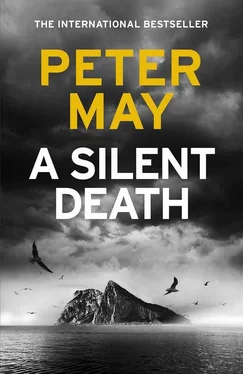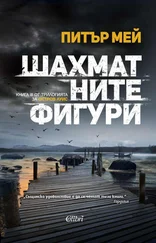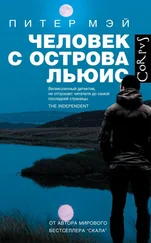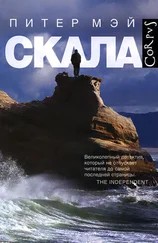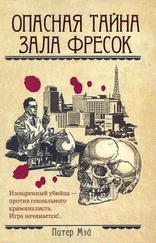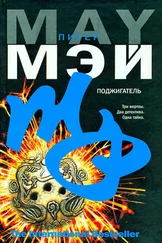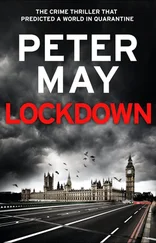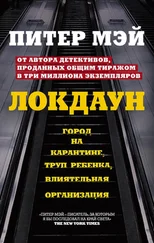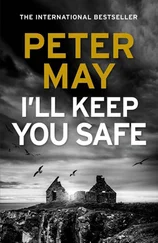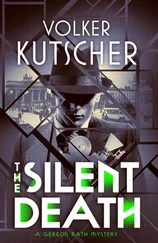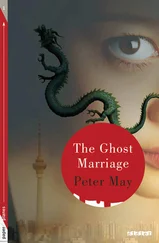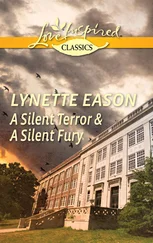‘Señor Mackenzie! For God’s sake, hombre , what’s going on in there?’
He blinked and took in the blurry red numerals on the bedside clock. It was a little after 6 am. He scrambled from the bed, boxer shorts bought in Estepona clinging to every perspiring contour, and unlocked the door. Cristina stood on the landing looking at him. She was in full uniform, no make-up, sleep still in her eyes, hair pulled back in its customary ponytail. Severe, unforgiving. Her gaze wandered down to the boxers and quickly back to meet his eye.
‘Who’s Sophia?’
‘My daughter.’
She peered beyond him into the empty bedroom. ‘Why were you shouting at her?’
‘Was I?’
‘I’d be surprised if there’s anyone still asleep in the whole of Marviña.’
Mackenzie looked sheepish. ‘It was a bad dream.’
She looked at him for a curious moment, then said, ‘Get dressed. We’ve got a multiple homicide up in the hills.’
His brow creased in a frown. ‘And what does that have to do with Cleland?’
‘They think it’s drug-related.’
The headlights of Cristina’s Policía Local SUV picked out great swathes of undeveloped countryside, dusty and deserted in the moonlight, before the road began climbing and winding its way through the forest in the foothills of the mountains. They passed lonely farmhouses, and the occasional family restaurant tucked into folds in the hills — Venta García, Venta Victoria.
The moon had disappeared from view, and the first light was burgeoning in the east, reflecting pink light on dawn cloud over the sea.
They turned off the asphalt road on to a concrete track that cut its way through overhanging cork oaks. It almost glowed in the early light, like the trail left by some giant drunken slug. The SUV bounced and rattled its way over an uneven surface made worse by wholly unnecessary speed bumps. Climbing, climbing, sometimes dropping sheer away into dark bottomless gullies, until they reached a fork in the road, where a signpost dating back to at least the early part of the previous century had been struck by some errant vehicle, and lay twisted and half-buried in the hillside. Originally intended to guide drivers towards two different destinations — Cabezas del Río and La Peña — it was no longer clear which way led to which.
Cristina pulled the SUV to a halt, and it sat idling at a precarious angle while she leaned over Mackenzie to search for a map in the glove compartment. When she found the one she was looking for she opened it against the steering wheel and flicked on the dash light. Mackenzie squinted at the map to see her tracing their route with her finger. She stabbed it at a tiny winding road that headed north-east into the hills. ‘That’s the one we want. Finca Los Fernández is on the road to La Peña.’ She pushed the map at Mackenzie, released the handbrake and swung the wheel to their left, lurching off through the half-dark towards the lost village of La Peña.
After a couple of kilometres the concrete ran out, and the road became little more than a dirt track, rutted and potholed, throwing the SUV and its occupants forwards and sideways, and reducing their progress to a snail’s pace. Finally they emerged from the forest into grassy uplands that swept away to the left and right in bold strokes through valleys and ravines towards the mountains. Nothing much grew up here except grass for grazing, almond trees in pink and white blossom, and the odd wild olive. An even narrower track took them off to the left, and down into a tiny sheltered valley where a whitewashed finca and a collection of agricultural outbuildings huddled in the shade of a copse of fig trees.
Two Guardia Civil vehicles and an ambulance stood in the yard, blue and amber flashing in the dawn light. Mackenzie expressed his astonishment. ‘How in God’s name did anyone even know that something had happened way up here?’
Cristina pulled up behind the other vehicles and jumped out. ‘A local goatherd. He was in the habit of dropping in early for coffee. They’re up and working at four or five in the hills to avoid the heat of the day.’
They walked towards the house. This was a traditional Andalusian finca, a farmhouse on one level with rough white-painted walls and a red, shallow-pitched Roman-tiled roof. It was built half into the hillside to provide cool cellar space beneath the house, and an adjoining barn was roofed, surprisingly, with rows of brand-new solar panels. Blue and white crime-scene tape had been stretched across the entrance to the property and hung limp in the still morning air. The ambulance driver and a medic leaned against the front of their vehicle, catching a final smoke before heading back down the hill. Nothing for them here. Everyone dead. A private contractor would be sent by the judicial coroner to take the bodies down for autopsy.
A figure familiar to Cristina detached itself from the group of Guardia standing in the yard. Paco hobbled towards them on his crutches. Cristina raised an eyebrow in surprise.
‘What are you doing here?’
Paco balanced on his supports to kiss her on each cheek. ‘Can’t sleep since I got home,’ he said. ‘So I sit up and drink coffee and listen to the Guardia bandwave. Heard this one called in and asked the guys to collect me on the way up.’
Cristina nodded and half-turned towards Mackenzie. ‘Paco’s my brother-in-law. The one Cleland shot. Señor Mackenzie is with the British police.’ Mackenzie and Paco shook hands. Paco sighed and Mackenzie saw deep sadness in his dark eyes. ‘I know these people,’ he said. ‘Friends of my folks going way back.’
‘How bad is it?’ Cristina asked.
‘It’s bloody. You don’t want to go in there if you don’t have to.’
Cristina nodded grimly. ‘I think we probably have to. How long before homicide arrive?’
‘Well, the pathologist’s already here. He came straight up from Marbella. Homicide are coming from Malaga. It’ll be a while yet.’
‘We don’t want to waste time, then.’ She went into the back of the SUV to remove plastic shoe covers and latex gloves for Mackenzie and herself.
The lights in the house were all turned on, and yet it still seemed dark. The front door took them into a single large room with an open fireplace at one end. An old porcelain sink stood against the facing wall, flanked by rough wooden worktops hung with curtains. A window above the sink leaked early light into the room. A table where the family had no doubt eaten for a generation sat square in the centre of the room. An old dresser and wooden drawer units crowded surrounding walls that were hung with old black-and-white family portraits dating back a hundred years or more. There was a photograph of the house taken in another lifetime. Also black-and-white. It hadn’t changed. The same fig trees, the tendrils of their sinewy roots snaking out across the front yard, cast shade from the same sun. The only difference between then and now was that the family were all dead.
Drawers had been ripped out of cupboards and wall units and contents strewn across the floor. Glass and china lay shattered on cold Andalusian tiles among upturned chairs where blood congealed in great dark pools.
A pathologist in white Tyvek crouched over one of three bodies. A young man who Mackenzie guessed was probably in his late twenties or early thirties. But it was difficult to tell. This was a hard life, and people aged quickly under a relentless and unforgiving sun. Also, his face was a bloody, pulpy mess.
An elderly couple lay nearby. His parents, Mackenzie thought. The old woman’s skull had been cleaved almost in two, and there was a gaping hole in the old man’s chest.
Cristina, standing beside him, made a muted gagging sound, and Mackenzie guessed she was fighting to keep down the bile rising in her throat. A smell of blood, like rust, hung heavy in the air.
Читать дальше
